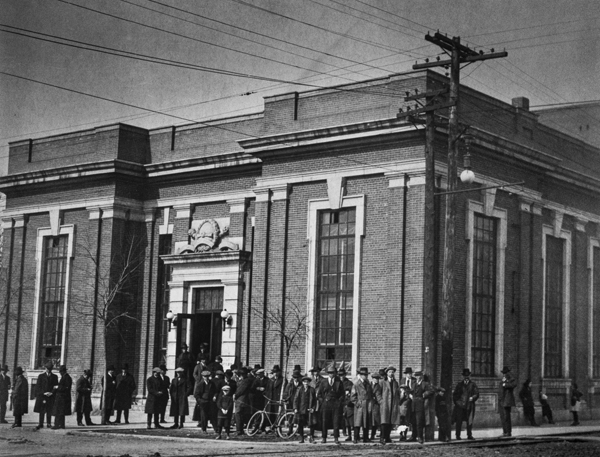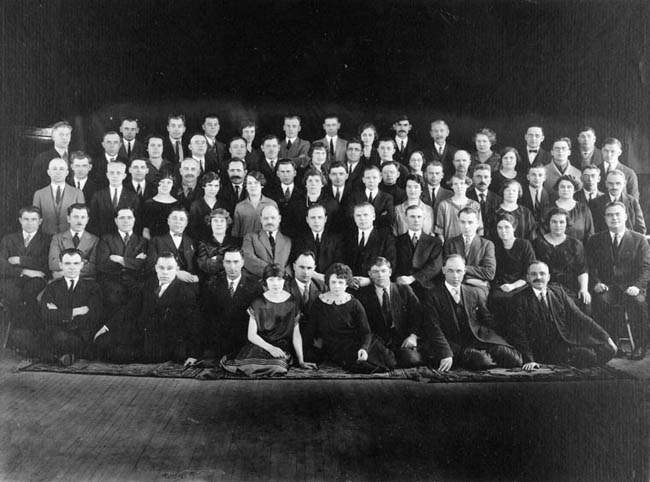Ukrainian Labour-Farmer Temple Association
Ukrainian Labour-Farmer Temple Association (Товариство український робітничо-фармерський дім; Tovarystvo ukrainskyi robitnycho-farmerskyi dim, or ULFTA). A nationwide pro-Communist organization in Canada active in the interwar era. The emergence of left-wing political organizations among Ukrainians in Canada was motivated, to a large extent, by the difficult challenges experienced by the first wave of Ukrainian immigrants (1891–1914) in establishing homesteads in the prairie provinces. Those who settled in urban areas often faced discrimination, periods of unemployment and poverty. As a result of such hardships, individual immigrants became politically radicalized and founded the Ukrainian Social Democratic Party of Canada (USDPC) in 1914. In addition, the internment of many Ukrainians from the Austro-Hungarian Empire as ‘enemy aliens’ during the First World War by the Canadian federal government contributed to the wave of discontent among the new immigrants. Keen interest in the political developments in the Ukrainian homeland led to organized support for the growing socialist political movements in Ukraine. On 1 March 1918 Ukrainian members and sympathizers of the Socialist Party of Canada, the USDPC, and other left-wing groups held a meeting in Winnipeg to establish the Ukrainian Labour Temple Association (ULTA). Plans were made to build a Ukrainian labour temple (robitnychyi dim) as a community center and to promote the socialist movement in Canada. The building was completed in early 1919 and the Ukrainian Labour Temple became the centre of radical politics in Winnipeg.
Since the Canadian federal government continued to support Russia as an ally against Imperial Germany and the Austro-Hungarian Empire during the First World War, it viewed radical East European political groups with considerable suspicion. A number of members of the USDPC were interned in 1918 as ‘radical aliens’ and held in internment camps. The USDPC and their newspaper, Robochyi narod, were banned. On 17 June 1919 during the Winnipeg General Strike, the Ukrainian Labour Temple was raided by the Royal North-West Mounted Police.
The leadership of the ULTA supported the Bolshevik movement and campaigned against the rival anti-Bolshevik political groups in Canada and in Ukraine. The Bolshevik invasion of Ukraine (see Ukrainian-Soviet War, 1917–21) and the Polish occupation of Western Ukraine (see Ukrainian-Polish War in Galicia, 1918–19) created an exodus of Ukrainians from their homeland and the second wave of Ukrainian emigration to Canada (1920–39). The new arrivals included many military veterans of the Ukrainian struggle for independence (1917–20), many of whom were hostile toward ULTA. Nevertheless, in the 1920s the influence of the Soviet propaganda in Canada contributed to an idealized and romanticized interpretation of life in Soviet Ukraine and this increased the ULTA membership.
In the context of Canadian politics, the leadership of ULTA participated in the founding of the ‘underground’ Communist Party of Canada (CPC) in May 1921 and the Workers’ Party of Canada (WPC). The ULTA became one of the WPC’s affiliated ‘language federations,’ and Ukraïns’ki robitnychi visty became the official ULTA newspaper. Members of the ULTA and the WPC that united with the CPC, obtained a Dominion charter in 1924 under the new name, the Ukrainian Labour-Farmer Temple Association (ULFTA). From the earliest years, the leadership of ULFTA was composed of Ukrainian CPC members and the Winnipeg Labour Temple became the national center for the spread of ULFTA branches across Canada.
To attract more members, the ULFTA leadership organized and promoted cultural, educational and humanitarian activities. Among the more popular activities were the plays and performances by the Ukrainian Labour Temple Drama and Choral Circle and the Workers’ Theatre Studio in Winnipeg. As ULFTA branches were established in other Ukrainian communities, drama circles, dance groups, mandolin orchestras and choirs increased their popularity and attracted more members. This tradition of organizing cultural events and spectacles at local and regional levels continued for many more decades. Educational and literacy programs, literary evenings, and the ULFTA-associated press introduced the membership to class politics from a pro-communist perspective. For the youth, Ukrainian schools were established in the early 1920s and the Association of Ukrainian Labour Youth was founded in 1924, led by Ukrainian members of the Young Communist League. By March 1927, the Youth Section had 32 branches and 1,506 members in Canada. Several Ukrainian women’s committees were created and became the Women’s Section of the ULFTA. By 1929, there were more than 1,500 members of the Women’s Section and the overall ULFTA membership grew to 2,650. In 1928, there were over 165 ULFTA branches across Canada.
As early as in 1922, ULTA established the Workers’ Benevolent Association (WBA) as a mutual benefit organization. To attract even more members, ULFTA and WBA created the Workers’ and Farmers’ Co-operative Association in Winnipeg and similar associations in other Ukrainian communities. ULFTA also established a printing press at the Ukrainian Labour Temple in Winnipeg and published journals and newspapers that included Ukraïns’ki robitnychi visty, Robitnytsia, Svit molodi, Fermerske zhyttia, and Narodna hazeta. Prominent leaders of the ULFTA, WBA, and the Communist Party of Canada were Matthew Popovich, Ivan Navizivsky (Navis), Matthew Shatulsky, and also John Boychuk, Danylo Lobai, and Petro Prokopchak (Prokop).
The question of support for or opposition to the Soviet Union became the determining factor in the ideological orientation of Ukrainian individuals, organizations, institutions and the press in Canada and remained the central theme in Ukrainian Canadian literature and history until 1991. Rivalry among Ukrainian secular and political associations grew. When the pro-nationalist Ukrainian War Veterans’ Association of Canada was founded in 1928 in Winnipeg, the ULFTA and the WBA established the Society for the Aid of the Liberation Movement in Western Ukraine in order to also attract Ukrainian veterans to their ranks.
From the earliest years, the ULFTA leadership was actively involved in municipal, provincial, and federal politics and a number of ULFTA candidates stood for office at all levels. The Depression of the 1930s was a particularly difficult period for the Ukrainian workers and farmers and ULFTA members participated in protest meetings, hunger marches, labor strikes, the On-to-Ottawa trek in 1935, and other labor actions. During the 1930s, ULFTA protested the persecution and imprisonment of Ukrainians in Galicia, then administered by Poland. Members of ULFTA and CPC were recruited to serve in the International Brigades during the Spanish Civil War (1936–9). In most cases, local Ukrainian Labour Temples became centres of these activities in the various communities. During the Depression, the labour temples also provided food and shelter to the unemployed men who wandered across Canada in search of work. Friendships and loyalty to ULFTA and CPC, developed during these difficult times, survived for many decades despite RCMP surveillance and later, the Cold War. In 1939, there were approximately 10,000 ULFTA members in 201 branches and 113 labour temples.
The leadership of ULFTA and WBA remained within the orbit of the Communist Party of Canada and maintained close ties with Soviet Ukraine. ULFTA leaders regularly traveled to Soviet Ukraine during the 1920s and 1930s, some to attend political courses, and returned to spread favorable propaganda about conditions in the Soviet Union. This political connection came under close surveillance by the Royal Canadian Mounted Police from the earliest years, and especially during strikes and labor confrontations of the 1930s. During the early 1930s, individual ULFTA activists were arrested as members of the illegal CPC, held in prison, and some were deported to Europe.
However, the growth of ULFTA was also limited by controversies resulting from events in Soviet Ukraine. Informed members became concerned about the Bolshevization of the Ukrainian homeland, forced collectivization of agriculture, the Famine-Genocide of 1932–3, the disappearance of cultural activists and literary figures, and the many victims of the Stalinist purges and terror. Some leaders, such as Danylo Lobai, raised questions about these events in the Soviet Union and left or were expelled from ULFTA and CPC. Taking many members with them (to the newly formed Alliance of Ukrainian Organizations, later Ukrainian Workers’ League), they created a serious crisis within the association. The Molotov-Ribbentrop Pact of August 1939 also raised questions among some ULFTA members and increased the suspicions of the Canadian federal government about the loyalty of the ULFTA membership since the Soviet Union was now perceived as an ally of Nazi Germany.
The outbreak for the Second World War in September 1939 had a profound effect on ULFTA and the Ukrainian community. ULFTA and CPC supported Soviet Union’s policy that the war was an ‘imperialist war’ and actively discouraged Ukrainian Canadians from enlisting in the Canadian Armed Forces. The Canadian government banned ULFTA on 4 June 1940. Their leadership was interned and their property was confiscated under the War Measures Act. After the Nazi German invasion of the Soviet Union in June 1941, however, the relations with the former members of ULFTA improved and the leadership was released from internment in early 1942. Former members now fully supported the Canadian war effort, enlisted in the Canadian Armed Forces, campaigned for assistance to the Soviet Union, and donated to the Aid to Russia Fund. They formed the Association of Canadian Ukrainians in 1942, supported the National Council for Canada-USSR Friendship and were among the charter members of the Labor Progressive Party founded in 1943 as the legal front for the Communist Party of Canada. The confiscated buildings of ULFTA were returned to the former membership by the end of the war. Political respectability was sought by publicizing the contributions of former ULFTA members to the Canadian war effort and by the Soviet victories on the eastern front. The Association of United Ukrainian Canadians succeeded the ULFTA in 1946.
BIBLIOGRAPHY
Al'manakh TURFDim, 1918–1929 (Winnipeg 1930)
Lobai, Danylo. ‘Komunistychnyi rukh sered ukraïntsiv Kanady,’ in Propam’iatna knyha ukraïns'koho narodnoho domu v Vynypegu, ed Dmytro Doroshenko (Winnipeg 1949)
Kravchuk, Petro. Na novii zemli (Toronto 1958)
Kolasky, John (comp, ed, trans). Prophets and Proletarians: Documents on the History of the Rise and Decline of Ukrainian Communism in Canada (Edmonton 1990)
Martynowych, Orest. Ukrainians in Canada: The Interwar Years, Book 1 (Edmonton and Toronto 2016)
Myron Momryk
[This article was updated in 2023.]


